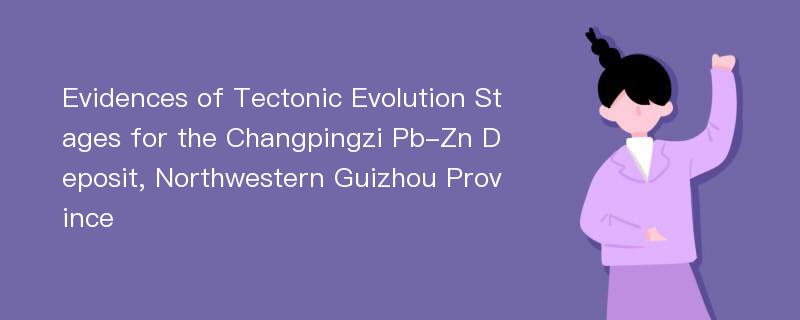
论文摘要
The Pb-Zn metallogenic area in northwestern Guizhou, located in the southwest margin of the Yangtze block, is an important part of the Sichuan-Yunnan-Guizhou(SYG) Pb-Zn metallogenic province. The Pb-Zn deposits in the area are evidently controlled by the NW-trending Weining-Shuicheng and Yadu-Mangdong fault zones. Among those, the Changpingzi Pb-Zn deposit is one of important deposits, which is located in the southwestern wing of the Jiangzishan anticline. This anticline is a first-order structure in the region along ZhazichangJiangzishan-Dapingzi areas with a total length of about 28 km and an axial direction of 310°, and the strata of two limbs is striking along NW-SE in the whole. Furthermore, the anticline also extends to the NE-trending Bainizhai anticline and cross each other at right angles. Also, the deposit developed three sets of fault structures, trending in NW, EW and NE, respectively. The NW fault structures, distributed near the hinge zone of the two wings of anticline and the faults in SW and NE wings having the opposing tendency, are: strike 300° to 320°, dip 30° to 50°. The EW fault structure is: strike 240°to 285°, dip approximately 55°to 60°. The NE fault structures are: strike 30°to 40°, dip approximately 60°, and its scale is smaller. Of which, the NWand EW-trending faults are major ore-controlling structure. By using the theory and method of Geomechanics(Sun and Han, 2016), the different structural features in the deposit have been summarized, and the mainly conclusions are listed as follows. The NW-striking faults have undergone three transformations in mechanical property from tensile→compressoshear→compresso-shear(sinistral). The first structural period is characterized by tensile breccias with a great disparity in size, cemented by white calcite, furthermore, the tectonic activities in this period are closely related to mineralization-alteration. The second period is characterized by granulite and comminuted rocks disseminated with reddish-brown ferromanganese, and there are a large amount of reddish-brown calcite on both sides of fault structures. The third period is characterized by closed fault zone, smooth fracture surfaces and gentle interface undulation, and whose surfaces developed scratches, steps and the white and reddish brown calcite films. By the analysis on geometry and mechanics of fault structures in different locations, it is found that calcite in the section where the fault strike changed from NW-trending to NNW or SN-trending, is massive and irregular plate-shaped with a width of 5-20 m. The transformations in mechanical property of EW-striking faults changed from tenso-shear(dextral)→compresso-shear to tensoshear. And the NE-striking faults, formed the latest, cutting through NW-trending and EW-trending faults, pinching out in the Jiangzishan anticline, present only compressive(sinistral) tectonism. Due to the influence of fault structures, the conjugate joints not development or strong deformation at
论文目录
文章来源
类型: 国际会议
作者: WANG Ziyong,HAN Runsheng,CHENG Chen
来源: 第九届世界华人地质科学研讨会 2019-06-01
年度: 2019
分类: 基础科学,工程科技Ⅰ辑
专业: 地质学,矿业工程
单位: Kunming University of Science and TechnologySouthwest Institute of Geological Survey, Geological Survey Center for Non-ferrous Metals Resources
分类号: P618.4
DOI: 10.26914/c.cnkihy.2019.028538
页码: 454
总页数: 1
文件大小: 159k
下载量: 2
